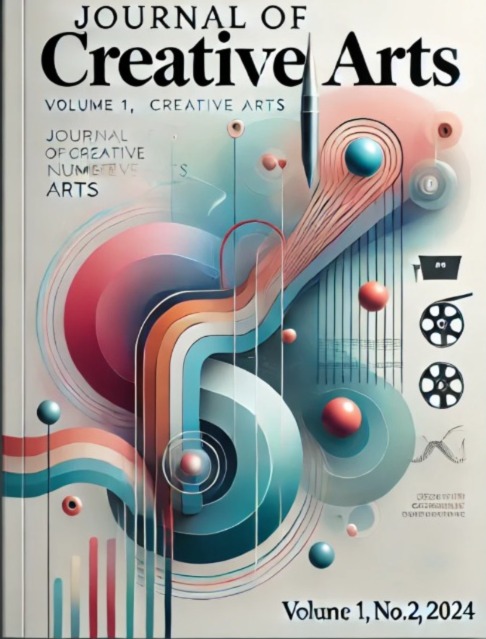Sound of Success: A Comprehensive Study on The Orff Method’s Philosophical Foundation And Impact on Young Children
DOI:
https://doi.org/10.24191/jca.v1i2.1292Keywords:
Orff Method, Music Education, Holistic Development, Musical SkillsAbstract
This study explores the efficacy of Carl Orff's methodology in the context of early childhood music education, particularly within the setting of private international schools in Malaysia. Carl Orff, known for his diverse talents in composition, philosophy, and music direction, promotes a music learning approach that is free from stress, allowing children to naturally explore sounds as an integral aspect of their development. This student-centric method is in harmony with the overall philosophy of holistic child development. The widespread adoption of the Orff approach among educators in Malaysian private international schools is attributed to its focus on creating a pleasurable and child-centered learning environment. Findings highlight the effectiveness of the Orff Approach, emphasizing its suitability for contemporary music education classes. The researcher recommends further exploration of the Orff approach’s impact on young children on musical coordination and the positive impact on their holistic development. As a valuable insight gained from this study, Orff Approach can be used as a guide for musical learning activities and a tool to improve the children’s communication skill during their collaboration in exploring music. To further the educator's understanding and proper approach to use for teaching students at younger age, the Orff Approach will be the most suitable approach in dealing with the larger group of younger students. By a comprehensive implementation of the Orff Approach in educational activities, it is envisioned that students will acquire improved understanding of a range of musical concepts and skills.
References
Allen, L., & Kelly, B. B. (2015). Child Development and Early Learning. In Transforming the workforce for Children Birth through age 8: A Unifying Foundation (pp. 85–88). essay, The National Academies Press.
Arasomwan, D. A., & Mashiy, N. J. (2021). Early childhood care and education educators’ understanding of the use of music-based pedagogies to teach communication skills. South African Journal of Childhood Education, 11(1). https://doi.org/10.4102/sajce.v11i1.896
Bhatia, M. K. (2017). Data Analysis and its importance - IRJAES. Data Analysis and its Importance. https://irjaes.com/wp-content/uploads/2020/10/IRJAES-V2N1P58Y17.pdf
Biasutti, M. (2017). Teaching improvisation through processes. applications in music education and implications for general education. Frontiers in Psychology, 8. https://doi.org/10.3389/fpsyg.2017.00911
Composition definition and meaning | Collins English dictionary. (n.d.-a). https://www.collinsdictionary.com/dictionary/english/composition
Dudt, S., & Jakobi, R. (2004). Improvisation in music - emc-imc.org. Documentation of the conference 22 - 24 October 2004 Royal Conservatoire. https://www.emc-imc.org/fileadmin/user_upload/Publications/dokuAM04.pdf
Glossary of musical terms - Western Michigan University. (n.d.). https://wmich.edu/mus-gened/mus150/Glossary.pdf
Gray, P. (2011). The Evolutionary Biology of Education: How our hunter-gatherer educative instincts could form the basis for Education today. Evolution: Education and Outreach, 4(1), 28–40. https://doi.org/10.1007/s12052-010-0306-1
Gustafsson, J. (2017, January). Single Case Studies vs. Multiple Case Studies. Single Case Studies vs. Multiple Case Studies; Comparative Studies. https://oatd.org/oatd/record?record=oai%5C:DiVA.org%5C:hh-33017
Johnson, D. (2017, June). Music Works. How Orff is Your Schulwerk? https://libres.uncg.edu/ir/uncw/f/johnsond2017-3.pdf
Johnson, D. (2006). Carl Orff - Musical Humanist. The International Journal of the Humanities: Annual Review, 3. https://doi.org/10.18848/1447-9508/cgp
Kasinathan, S. (2023b, May 30). Experts: lack of quality teachers in preschool education hinders early childhood development in malaysia. MalayMail. Retrieved from https://www.malaymail.com/news/malaysia/2023/05/30/experts-lack-of-quality-teachers-in-preschool-education-hinders-early-childhood-development-in-malaysia/71721#google_vi gnette.
Khodijah, S., & Kurniawati, L. (2020). Teachers’ understanding of music for Early Childhood . Advances in Social Science, Education and Humanities Research, volume 538. https://www.atlantis-press.com/article/125954481.pdf
Kheioh, S. L., & Low, H. M. (2022). A case study of Malaysian teachers’ practice of play-based learning in preschool. Kajian Malaysia, 40(1), 19–38. https://doi.org/10.21315/km2022.40.1.2
Kohlbacher, F. (2006). The use of qualitative content analysis in case study research. Forum Qualitative Sozialforschung / Forum: Qualitative Social Research. https://doi.org/10.17169/FQS-7.1.75
Kwon, O.-S., & Lee, O.-J. (2012). The effects of the Orff Approach to music education programs on young children’s musical expressiveness. Korean Journal of Child Studies, 33(1), 165–181. https://doi.org/10.5723/kjcs.2012.33.1.165
Lxtupe, D. P. (2017). The Benefits of Music in Child Development . California State University, Monterey Bay
https://digitalcommons.csumb.edu/cgi/viewcontent.cgi?article=1106&context=caps_thes_a ll
Maguire, M., & Delahunt, B. (2017). Doing a Thematic Analysis: A Practical, Step-by-Step Guide for Learning and Teaching Scholars. All Ireland Journal of Higher Education, 8(3), 3353–33514.
Marisi, R. (2021). The parody mass and the rhetorical-pedagogical principle of imitation. Review of Artistic Education, 21(1), 12–19. https://doi.org/10.2478/rae-2021-0002
Marzuki, M. A., & Rahman, S. (2017). The effectiveness of the ‘child-friendly’ approach in educating health-related behaviour in children. Advanced Science Letters, 23(3), 2153–2158. https://doi.org/10.1166/asl.2017.8582
McCombes, S. (2023, November 20). What is a case study?: Definition, Examples & Methods. Scribbr. https://www.scribbr.com/methodology/case-study/#:~:text=Published%20on%20May%20 8%2C%202019,%2C%20clinical%2C%20and%20business%20research.
Meltzoff, A. N. (2020). Imitation and modeling. Encyclopedia of Infant and Early Childhood Development, 100–109. https://doi.org/10.1016/b978-0-12-809324-5.05827-2
Nan, W. (2022). Exploration of orff music education in colleges’ preschool education major. International Conference on Educational Informatization, E-commerce and Information System. https://www.semanticscholar.org/paper/Exploration-of-Orff-Music-Education-in-Colleges %E2%80%99-Nan/38b2c3906cece1b8a74c999bfb0c11b3a0ad0d5e
Pakpahan, F. H., & Saragih, M. (2022). Theory of cognitive development by Jean Piaget. Journal of Applied Linguistics, 2(2), 55–60. https://doi.org/10.52622/joal.v2i2.79
Rodriguez, J. (2018, April). Theories of Cognitive Development. (PDF) theories of Cognitive Development. https://www.researchgate.net/publication/324261184_Theories_of_Cognitive_Development
Saarni, C., & Camras, L. (2022, September). Emotional development in childhood. Emotional Development in Childhood. https://www.child-encyclopedia.com/pdf/expert/emotions/according-experts/emotional-dev elopment-childhood
Sarrazin, N. (2016, June 15). Music and the child. Chapter 4: Approaches to Music Education | Music and the Child. https://courses.lumenlearning.com/suny-music-and-the-child/chapter/chapter-4-approaches -to-music-education-2/
Salmon, S. (2016). How the orff approach can support inclusive music teaching. Exceptional Music Pedagogy for Children with Exceptionalities, 39–60. https://doi.org/10.1093/acprof:oso/9780190234560.003.0003
Udoka Eze , V. H. (2023, January). (PDF) qualitative research. International Digital Organization for Scientific Research. https://www.researchgate.net/publication/367221023_Qualitative_Research
Wilson, T. (2022). Impact of Social Emotional Learning and The Orff Approach (dissertation). Education Resources Information Center, Wisconcin.
Downloads
Published
How to Cite
Issue
Section
License
Copyright (c) 2024 Sherah Kaur

This work is licensed under a Creative Commons Attribution-NonCommercial 4.0 International License.




